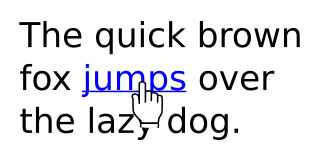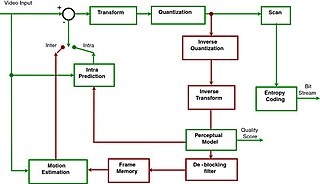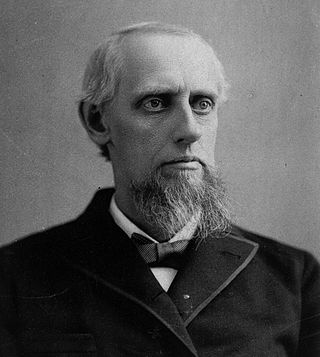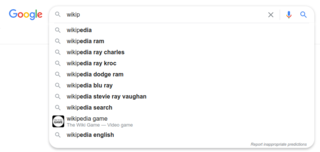Related Research Articles

A telephone is a telecommunications device that permits two or more users to conduct a conversation when they are too far apart to be easily heard directly. A telephone converts sound, typically and most efficiently the human voice, into electronic signals that are transmitted via cables and other communication channels to another telephone which reproduces the sound to the receiving user. The term is derived from Ancient Greek: τῆλε, romanized: tēle, lit. 'far' and φωνή, together meaning distant voice. A common short form of the term is phone, which came into use early in the telephone's history.

Sir Timothy John Berners-Lee, also known as TimBL, is an English computer scientist best known as the inventor of the World Wide Web, the HTML markup language, the URL system, and HTTP. He is a professorial research fellow at the University of Oxford and a professor emeritus at the Massachusetts Institute of Technology (MIT).

The World Wide Web is an information system that enables content sharing over the Internet through user-friendly ways meant to appeal to users beyond IT specialists and hobbyists. It allows documents and other web resources to be accessed over the Internet according to specific rules of the Hypertext Transfer Protocol (HTTP).

In computing, a hyperlink, or simply a link, is a digital reference to data that the user can follow or be guided to by clicking or tapping. A hyperlink points to a whole document or to a specific element within a document. Hypertext is text with hyperlinks. The text that is linked from is known as anchor text. A software system that is used for viewing and creating hypertext is a hypertext system, and to create a hyperlink is to hyperlink. A user following hyperlinks is said to navigate or browse the hypertext.

Advanced Video Coding (AVC), also referred to as H.264 or MPEG-4 Part 10, is a video compression standard based on block-oriented, motion-compensated coding. It is by far the most commonly used format for the recording, compression, and distribution of video content, used by 91% of video industry developers as of September 2019. It supports a maximum resolution of 8K UHD.

Alexa Internet, Inc. was an American web traffic analysis company based in San Francisco. It was a wholly-owned subsidiary of Amazon.

Eolas is a United States technology firm formed as a spin-off from the University of California, San Francisco (UCSF), in order to commercialize UCSF's patents for work done there by Eolas' co-founders, as part of the Visible Embryo Project. The company was founded in 1994 by Dr. Michael Doyle, Rachelle Tunik, David Martin, and Cheong Ang from the UCSF Center for Knowledge Management (CKM). The company was created at the request of UCSF, and was founded by the inventors of the university's patents.

Pop-up ads or pop-ups are forms of online advertising on the World Wide Web. A pop-up is a graphical user interface (GUI) display area, usually a small window, that suddenly appears in the foreground of the visual interface. The pop-up window containing an advertisement is usually generated by JavaScript that uses cross-site scripting (XSS), sometimes with a secondary payload that uses Adobe Flash. They can also be generated by other vulnerabilities/security holes in browser security.

Amos Emerson Dolbear was an American physicist and inventor. Dolbear researched electrical spark conversion into sound waves and electrical impulses. He was a professor at University of Kentucky in Lexington from 1868 until 1874. In 1874 he became the chair of the physics department at Tufts University in Medford, Massachusetts. He is known for his 1882 invention of a system for transmitting telegraph signals without wires. In 1899 his patent for it was purchased in an unsuccessful attempt to interfere with Guglielmo Marconi's wireless telegraphy patents in the United States.
JBIG is an early lossless image compression standard from the Joint Bi-level Image Experts Group, standardized as ISO/IEC standard 11544 and as ITU-T recommendation T.82 in March 1993. It is widely implemented in fax machines. Now that the newer bi-level image compression standard JBIG2 has been released, JBIG is also known as JBIG1. JBIG was designed for compression of binary images, particularly for faxes, but can also be used on other images. In most situations JBIG offers between a 20% and 50% increase in compression efficiency over Fax Group 4 compression, and in some situations, it offers a 30-fold improvement.

A search engine is a software system that provides hyperlinks to web pages and other relevant information on the Web in response to a user's query. The user inputs a query within a web browser or a mobile app, and the search results are often a list of hyperlinks, accompanied by textual summaries and images. Users also have the option of limiting the search to a specific type of results, such as images, videos, or news.

NeoPlanet was a Trident-shell graphical web browser initially released in 1997 by New York–based Bigfoot International, Inc. and later maintained and developed by its subsidiary NeoPlanet, Inc. It was one of the first browsers to be fully skinnable.
Selected Patient Information Resources in Asian Languages (SPIRAL) was a web resource that connects people to authoritative health information in Asian languages that was freely available online. SPIRAL was maintained by the Tufts University Hirsh Health Sciences Library and funded by grant from the New England Region of the National Network of Libraries of Medicine.

Cuil was a search engine that organized web pages by content and displayed relatively long entries along with thumbnail pictures for many results. Cuil said it had a larger index than any other search engine, with about 120 billion web pages. It went live on July 28, 2008. Cuil's servers were shut down on September 17, 2010, with later confirmations the service had ended.

The Wayback Machine is a digital archive of the World Wide Web founded by the Internet Archive, an American nonprofit organization based in San Francisco, California. Created in 1996 and launched to the public in 2001, it allows the user to go "back in time" to see how websites looked in the past. Its founders, Brewster Kahle and Bruce Gilliat, developed the Wayback Machine to provide "universal access to all knowledge" by preserving archived copies of defunct web pages.
Jeffery D. "Jeff" Black is an American chief executive officer and chief strategy officer associated with the information technology industry. He also is a programmer and inventor, holding six patents.
Ghacks Technology News is a technology blog created by Martin Brinkmann in October 2005. Its primary focus is on web browser and Windows tips, software, guides and reviews.
Graphiq is a semantic technology company that uses artificial intelligence to rapidly create interactive data-driven infographics. Its intent is similar to Wolfram Alpha which is designed to provide users with direct information on a variety of subjects rather than going through a search engine.

Viv is a discontinued intelligent personal assistant created by the developers of Siri.
Internet Video Coding is a video coding standard. IVC was created by MPEG, and was intended to be a royalty-free video coding standard for use on the Internet, as an alternative to non-free formats such as AVC and HEVC. As such, IVC was designed to only use coding techniques which were not covered by royalty-requiring patents.
References
- ↑ US Patent 6691163. Use of web usage trail data to identify related links. Patrick Tufts. Assigned to Alexa Internet.
- ↑ US Patent 7159023.